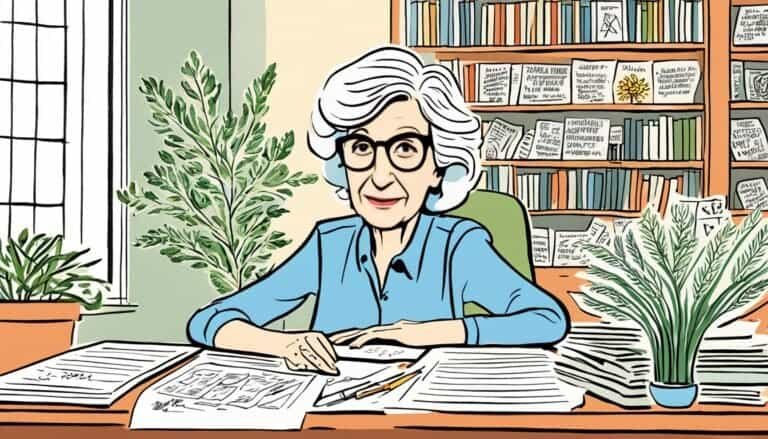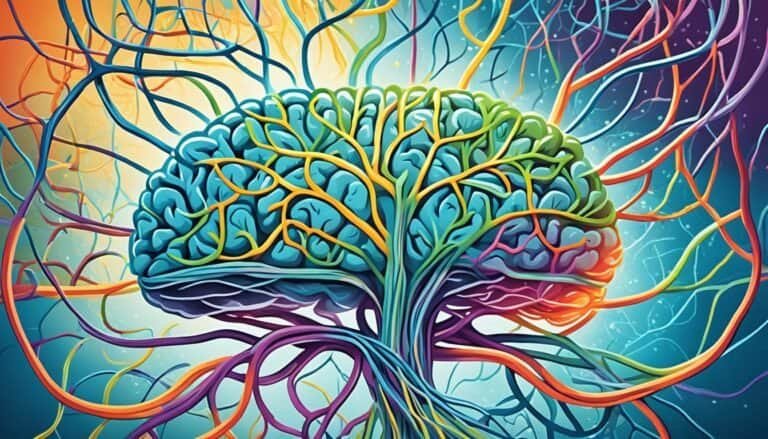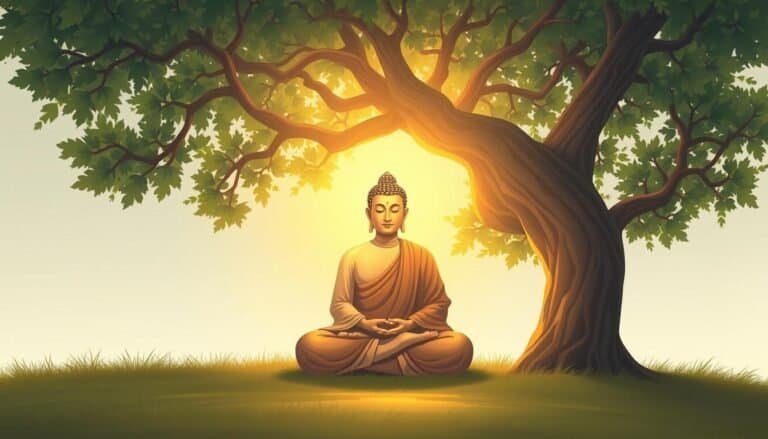Thich Nhat Hanh: Mindfulness and Inner Peace
“Peace in oneself, peace in the world.” This quote by Thich Nhat Hanh starts our journey into his teachings on mindfulness and peace. His wisdom has changed many lives, showing us how to find joy and calm in today’s busy world.
Thich Nhat Hanh introduced his teachings in the West in the early 1970s. His way of meditating and focusing on the present has changed how we see mindfulness. He teaches that true happiness is found in the now, not later.
His teachings reach far beyond just Buddhists. They’ve inspired peace activists, teachers, and even politicians around the globe. Thich Nhat Hanh mixes old wisdom with new ideas to help us find peace in our busy lives.
Thich Nhat Hanh shows us that mindfulness isn’t just for sitting in silence. It’s a way to live, a kind of energy we can use every day. This way of living helps us connect deeply with each moment. It builds compassion and understanding with others and ourselves.
The Life and Legacy of Thich Nhat Hanh
Thich Nhat Hanh started his journey in Zen Buddhism early, becoming a global peace advocate. His teachings on calming the mind and finding peace have reached millions. He has made a huge impact worldwide.
Early Years and Spiritual Journey
Thich Nhat Hanh was born in Vietnam and entered monastic life at 16. He worked hard in Zen Buddhism, creating new mindful breathing and walking practices. In 1966, he went to the US to speak for peace, facing a 39-year exile.
Contributions to Buddhism and Mindfulness
Thich Nhat Hanh has deeply influenced Buddhism and mindfulness. He has written over 100 books, from poetry to meditation guides. His teachings have started mindfulness programs around the world, helping reduce stress and improve focus in schools and offices.
- Founded Plum Village Monastery in France
- Trained over 2,000 people in Engaged Buddhism
- Influenced Google’s Search Inside Yourself course
Impact on Global Peace Movements
Thich Nhat Hanh’s impact goes beyond Buddhism. He was key in the Vietnam War peace efforts. Dr. Martin Luther King Jr. nominated him for the Nobel Peace Prize in 1967. His teachings on peace and compassion have reached many, from politicians to war veterans.
“Peace in oneself, peace in the world.” – Thich Nhat Hanh
Today, Thich Nhat Hanh’s legacy lives on through his global community. He has over 700 monastic disciples and hundreds of thousands of followers. They practice his teachings on mindfulness and inner peace.
Understanding Mindfulness: Thich Nhat Hanh’s Perspective
Thich Nhat Hanh teaches more than just meditation. He sees mindfulness as a way to find peace and live right. He says to be aware of the moment in everything we do, like talking, working, or just being with the world.
Thich Nhat Hanh shares his thoughts through many books. He has written over 100 English titles. These cover meditation, handling tough feelings, and Buddhist teachings. He talks about how we’re all connected, a idea he calls “interbeing.”
“Meditation is not limited to the sitting cushion but extends to guiding actions and behaviors to create happiness for oneself and others.”
He believes happiness isn’t just for us. It’s linked to everyone and everything. This idea shows in his advice on talking well, making good relationships, and building mindful communities.
| Aspect of Mindfulness | Thich Nhat Hanh’s Teaching |
|---|---|
| Present Moment Awareness | Found through mindfulness, not extensive study |
| Emotional Healing | Mindfulness soothes painful emotions |
| Relationships | Mindfulness integrated into interpersonal connections |
| Environmental Awareness | Mindfulness promotes ecological preservation |
Thich Nhat Hanh gives us ways to bring mindfulness into our everyday lives. He helps us find peace and care for ourselves and others.
The Art of Mindful Living: Practical Teachings
Thich Nhat Hanh’s teachings have changed lives all over the world. He teaches us to be mindful in everyday tasks. Let’s look at some ways to bring mindfulness into our daily lives.
Mindful Breathing Techniques
Mindful breathing is key to many meditation practices. It helps us stay in the now. This simple method helps us control our feelings and find peace.
Walking Meditation
Thich Nhat Hanh created a special walking meditation. It mixes moving your body with being fully present. This is a great way to live mindfully every day.
Mindful Eating and Daily Activities
We can be mindful while eating, brushing our teeth, or washing dishes. These activities help us slow down and enjoy each moment. This makes us feel better overall.
| Book Title | Price (€) | Focus |
|---|---|---|
| In Touching Peace | 13.00 | Peace and mindfulness |
| The Blooming Of A Lotus | 20.45 | Guided meditation |
| The Miracle Of Mindfulness | 12.00 | Introduction to mindfulness |
| True Love | 12.00 | Mindful relationships |
| Your True Home | 18.00 | Daily life practice |
Thich Nhat Hanh teaches us to be mindful all day. By adding these practices to our lives, we can act with kindness. This helps us and those around us.
“Mindfulness is not something that is only done in the meditation hall, it is to be practiced everywhere.”
Thich Nhat Hanh: Mindfulness and Inner Peace
Thich Nhat Hanh, a famous Buddhist monk, spent his life sharing spiritual teachings on mindfulness and inner peace. He taught that global peace begins with us. His ideas show how our inner peace affects the world around us.
In “Peace Is Every Step,” Thich Nhat Hanh goes deep into this idea. This 134-page book, available for $17.00, helps readers find peace daily. It’s a guide that has changed lives across the globe.
“Peace in oneself, peace in the world.” – Thich Nhat Hanh
Thich Nhat Hanh talks about the need to find peace in our bodies and minds. He suggests ways to release tension and make peace with others. He thinks these steps are key to a peaceful world.
His teachings have made mindfulness popular. By 2015, 80% of medical schools taught it, showing its benefits for mental health. His ideas have touched many areas, from psychology to environmental issues. This shows how inner peace can lead to positive changes worldwide.
Cultivating Compassion and Loving-Kindness
Thich Nhat Hanh teaches us about the power of compassion. It helps us be mindful and find peace inside. By being kind, we change our lives and the world.
The Practice of Metta Meditation
Metta meditation, or loving-kindness meditation, is key to growing compassion. We send kind thoughts to ourselves and others. This makes our circle of kindness bigger.
- It helps stop self-harm in those who feel suicidal
- It makes us feel better inside
- It slows down aging in our cells
- It lessens pain in people with chronic pain
- It makes us more empathetic and connected with others
Developing Empathy and Understanding
Being compassionate turns on parts of our brain that feel good. When we let ourselves feel others’ pain, we grow more empathetic. This lowers stress, heals us, and comforts others.
Compassionate Action in Daily Life
Thich Nhat Hanh says compassion goes beyond judging. It’s a strong force for good. By being kind every day, we make a caring world. This means talking kindly, showing real care, and understanding others, even if they’re different from us.
| Compassionate Practice | Benefit |
|---|---|
| Self-compassion | Sustains compassion towards others |
| Mindful breathing | Cultivates present-moment awareness |
| Loving-kindness meditation | Enhances empathy and social connections |
| Compassionate listening | Deepens understanding in relationships |
By following these steps, we can make a kinder world. We’ll be more mindful and peaceful, and so will those around us.
Interconnectedness and the Concept of “Interbeing”
Thich Nhat Hanh, a key figure in Zen Buddhism, introduced “interbeing” in 1982. This idea shows how everything is connected. It’s a key part of finding peace and mindfulness. The Plum Village Tradition, led by Thich Nhat Hanh, teaches this idea.
Interbeing helps us see our connection with others and the world around us. It’s the heart of engaged Buddhism. This approach mixes personal spiritual growth with helping others.
Mindfulness is key to understanding interbeing. By being more aware, we see how everything depends on each other. This awareness leads to living in a way that’s good for the planet and others.
“When you understand interbeing, you naturally take care of the Earth and others around you.”
Thich Nhat Hanh believes finding peace within ourselves helps make the world a better place. By being mindful and full of love, we can make society more caring and thoughtful.
| Aspect | Impact of Interbeing |
|---|---|
| Personal Growth | Deeper self-awareness and compassion |
| Relationships | More harmonious and understanding interactions |
| Environment | Increased care and respect for nature |
| Society | Greater focus on collective well-being |
Overcoming Suffering Through Mindfulness
Thich Nhat Hanh’s teachings offer powerful tools for transforming suffering into peace. His book “Peace Is Every Step,” first published in 1991, provides practical techniques for calming the mind and finding inner peace. This work, along with over sixty other books he’s written, has helped millions cultivate mindfulness in their daily lives.
Transforming Negative Emotions
Mindfulness practices can help us handle strong emotions like anger, fear, and anxiety. By focusing on the present moment, we can redirect our thoughts towards peace. This approach is particularly useful for activists and those facing challenging situations.
Healing from Trauma and Pain
Thich Nhat Hanh’s teachings emphasize the importance of living in the present moment to heal from past traumas. His book “The Miracle of Mindfulness” offers meditation practices that can help transform pain into growth and understanding.
Finding Peace in Difficult Times
Even in the midst of turmoil, we can find peace within ourselves. Thich Nhat Hanh’s work encourages us to cultivate inner calm as a foundation for creating a more peaceful world. By practicing mindfulness in our daily activities, we can nurture happiness and handle suffering more effectively.
“When we are mindful, deeply in touch with the present moment, our understanding of what is going on deepens, and we begin to be filled with acceptance, joy, peace and love.”
These teachings continue to resonate with people worldwide. Online platforms like Udemy now offer courses based on Thich Nhat Hanh’s principles, making these valuable meditation practices accessible to over 11 million students globally.
Thich Nhat Hanh’s Teachings on Environmental Awareness
Thich Nhat Hanh’s teachings go beyond just personal mindfulness. They also focus on caring for our planet. He teaches us to be aware of the present moment and how it connects us to the Earth.
In 2014, the United Nations asked Thich Nhat Hanh for advice on climate change. He said we are deeply connected to the Earth. He explained, “Each one of us carries the Earth within every cell of our body,” showing how our breath links us to the planet.
Thich Nhat Hanh believes we need to change how we see the Earth. He suggests we should see ourselves as part of it, not separate from it. This view builds a deep love and respect for our planet, beyond any cultural or religious divide.
“The Earth and all species on Earth are in real danger. We need to fall in love with Earth and recognize that our personal and collective happiness and survival depend on it.”
He also talks about how our daily choices affect the planet. Thich Nhat Hanh suggests eating less meat and alcohol as a way to show love for ourselves, others, and the Earth. He believes true happiness comes from love and understanding in our hearts, not from what we own.
Thich Nhat Hanh encourages us to see the beauty of our planet and act to protect it. By being mindful of our bond with the Earth, we can help make a better, kinder world.
Applying Mindfulness in Relationships and Community
Mindful living isn’t just for us alone. It also shapes how we connect with others. Thich Nhat Hanh teaches us that being in the moment helps us show more compassion and form deeper bonds.
Mindful Communication
Good communication is key to strong relationships. When we talk mindfully, we make our interactions better. This means being kind in what we say, really listening, and thinking before we answer.
Building Harmonious Relationships
Mindfulness makes our relationships deeper and more understanding. By being fully present, we see and value each other more. This way, we handle disagreements with kindness, not just quick anger.
Creating Mindful Communities
Bringing mindfulness to our communities spreads positivity far and wide. These groups support each other in their mindful ways, creating a sense of belonging. They often do group meditation, mindful activities, and help projects together.
| Mindful Practice | Benefits |
|---|---|
| Daily Chanting | Enhances focus and spiritual connection |
| Guided Meditation | Reduces stress and improves mental clarity |
| Weekly Sangha Meetings | Builds community and reinforces practice |
| Walking Meditation | Increases present moment awareness |
By adding these mindful habits to our everyday, we can make our world kinder and more caring. We do this, one relationship and community at a time.
Conclusion
Thich Nhat Hanh changed the world with his teachings on mindfulness and inner peace. As a Buddhist monk and spiritual leader, he touched the lives of millions worldwide. His passing in 2022 was a loss, but his teachings and over 100 books continue to inspire us.
Thich Nhat Hanh made mindfulness popular for everyone, not just Buddhists. He showed us how to find peace in our busy lives. His ideas on self-care and living in the moment helped many find peace.
Even with challenges like finding it hard to meditate or thinking it’s boring, Thich Nhat Hanh had solutions. He taught us about “interbeing” and self-forgiveness. These ideas help us overcome obstacles and find deeper peace and connection.
Thinking about Thich Nhat Hanh’s life and teachings reminds us that true happiness is a way of living. By following his spiritual advice, we can keep his legacy alive. We can work towards a more mindful and caring world.
Source Links
- Key Teachings | Plum Village
- Thich Nhat Hanh | Insights on Compassion and Mindfulness
- The Life Story of Thich Nhat Hanh | Plum Village
- Thich Nhat Hanh Foundation
- The Life Story of Thich Nhat Hanh – Plum Village Hong Kong
- Key Books | Plum Village
- Books | Plum Village
- Peace Is Every Step: The Path of Mindfulness in Everyda…
- Touching Peace – The Plum Village Shop
- The Art of Mindful Living: How to Bring Love, Compassio…
- Thich Nhat Hanh – The Art of Mindful Living
- Peace Is Every Step – Parallax Press
- Thich Nhat Hanh, Purveyor of Peace Within and Without
- "Peace Is Every Step" by Thich Nhat Hanh
- Loving Kindness – Meditation Teaching of Thich Nhat Hanh
- How to cultivate compassion for inner peace and global wellbeing
- What Is Loving Kindness Meditation? (Incl. 4 Metta Scripts)
- Understanding Suffering, Compassion, and Interconnectedness | Plum Village
- Mindfulness and interconnectedness to all – Inner Pathways
- Learn to Reduce Stress: Mindfulness eCourse by Thich Nhat Hanh
- Finding inner peace through mindfulness: Book Peace Is Every Step
- Thich Nhat Hanh’s statement on Climate Change for the United Nations | Plum Village
- The Best of Thich Nhat Hanh: Life, Teachings, Quotes, and Books | Lion’s Roar
- "Build, block, be": a mindful response to challenging times – Plum Village Mobile App
- The Art of Mindful Living | Plum Village
- Mindfulness in Malaysia: Teachings on Love & Interdependence
- Thich Nhat Hanh and the Spiritual Significance of Mindfulness Psychology
- Thich Nhat Hanh’s final mindfulness lesson: How to die peacefully
- The Path to True Happiness







